-
Noun Clause
Subj + (verb: think/believe/know/understand/realize/remember/guess…) + [(that/what/which/who/why/) subj + verb + …]
- know: We know [that the earth is round].
- know: We know [what the problem is].
- know: We know [who stole the money].
- know: We know [which car has the problem].
- know: We know [why he was killed].
- forget: He forgot [that he had an appointment].
- forget: He forgot [which house it was].
- forget: He forgot [why he was there].
- forget: He forgot [who his friends were].
- think: I think [that she is right].
- believe: He believes [that hard work pays off].
- understand: I understand [what the issues are].
- realize: She realized [why we lost].
- remember: I remember [that we met last year].
- imagine: I imagine [that we are doomed].
- suppose: I suppose [that is true].
- guess: I guess [that is true].
- discover: They discovered [why the sky is blue].
- learn: We learned [that the earth revolves around the sun].
- decide: He decided [that he would go to college].
- show: The data shows [that the economy is terrible].
- prove: The evidence proves [which player is the best].
- say: She said [that she would be late].
- tell: He told me [when it will happen].
- explain: The teacher explained [that the test was postponed].
- report: The news reported [why America was crumbling].
- announce: They announced [that inflation will increase]
- declare: He declared [that he was innocent].
- claim: She claimed [that she saw a UFO].
- admit: He admitted [that he was wrong].
- deny: She denied [that she had stolen the money].
- confirm: They confirmed [that the flight was on time].
-
Subj + modal verb + main verb (original form) + (Rest of Sentence)
(no “s” for third person singular)
- Ability: can, could
- Permission: may, might, can, could
- Obligation: must, should, ought to
- Probability: will, would, should
- Possibility: may, might, could
Examples:
- She can speak three languages. (Ability)
- You may borrow my book. (Permission)
- They must leave now. (Obligation)
- It will probably rain tomorrow. (Probability)
- He might come to the party. (Possibility)
- I could help you with your homework. (Offer)
- Would you like some tea? (Polite request)
- We should study for the test. (Recommendation)
- You ought to apologize for your mistake. (Advice)
-
Adverbial Phrase(Prepositional Phrase, Infinitive Phrase..etc), [Your Sentence]
Prepositional Phrases
Under the bridge, the trolls lived in their gloomy cave.
After the storm, the air was fresh and clean.
With a smile, she accepted the award.
During the summer, we like to go swimming in the lake.
Across the street, the bakery was filled with delicious smells.Infinitive Phrases
Gerund phrases
-
Subject + Auxiliary Verb + Main Verb
-
Adverbial Clause
Subject (主语) + verb (动词) + (optional可用/可不用: object 宾语) + (subordinating conjunction 从属连词) + clause(主语 + 动词)
Modifies the verb:
A winner [practices] [until they feel tired].
subj – A winner verb – practices adverb clause – until they (s) feel (v) tiredI [became] an adult [when my wife gave birth].
subj – I verb – became adverb clause – when my wife (s) gave (v) birthI will [work] [until I become rich].
subj – I verb – will work adverb clause – until I(s) become (v) richI’ll [come] [after I finish breakfast].
subj – I’ll verb – come adverb clause – after I (s) finish (v) breakfastI [studied] [before I ate dinner].
subj – I verb – studied adverb clause – before I (s) ate (v) dinnerYou [push] the button [if anyone moves].
subj – You verb – push adverb clause – if anyone(s) moves(v)如果 subordinating conjunction 先开始的话,要用逗号:
(subordinating conjunction 从属连词) + clause(主语 + 动词), Subject (主语) + verb (动词) + (optional可用/可不用: object 宾语).When my wife gave birth, I [became] an adult .
[Before I ate dinner], I [studied].
[If anyone moves], you [push] the button.
[Since I want to be champion], I will [work] hard.
[When the train stopped], the people [got] on.
[When the bell rang], the students [rushed] out of the classroom.
Modifies the Adjective:
adjective + (subordinating conjunction 从属连词) + clause(主语 + 动词)
The water was so [cold] that my teeth started chattering.
She was so [tired] that she fell asleep on the couch.
She was more [excited] than I had ever seen her.
The cake was as [delicious] as she had promised.
Modifies the Adverb:
adverb + (subordinating conjunction 从属连词) + clause(主语 + 动词)
She spoke so [softly] that I could barely hear her.
He drives more [carefully] when it’s raining
They arrived [earlier] than we expected.
She sings more [beautifully] when she’s on stage.
-
Perceived action
Subj + Verb of perception + object + bare infinitive
Focus on the observed action: The bare infinitive emphasizes the action itself, not the time it happened. It’s like a snapshot of what the person saw.
“I saw him leave” means you witnessed the act of him leaving. It’s not about when he left, but that you saw it happen.
- She heard the bird sing. (Not “sang”)
- They watched the children play. (Not “played”)
- I felt the ground shake. (Not “shook”)
Category: My Past
lessons I’ve learned from my past
Modal verbs
The main modal verbs are “can,” “could,” “may,” “might,” “shall,” “should,” “will,” “would,” and “must.” Modal verbs refers to “modality”, which is possibility, ability, permission, obligation, and condition.
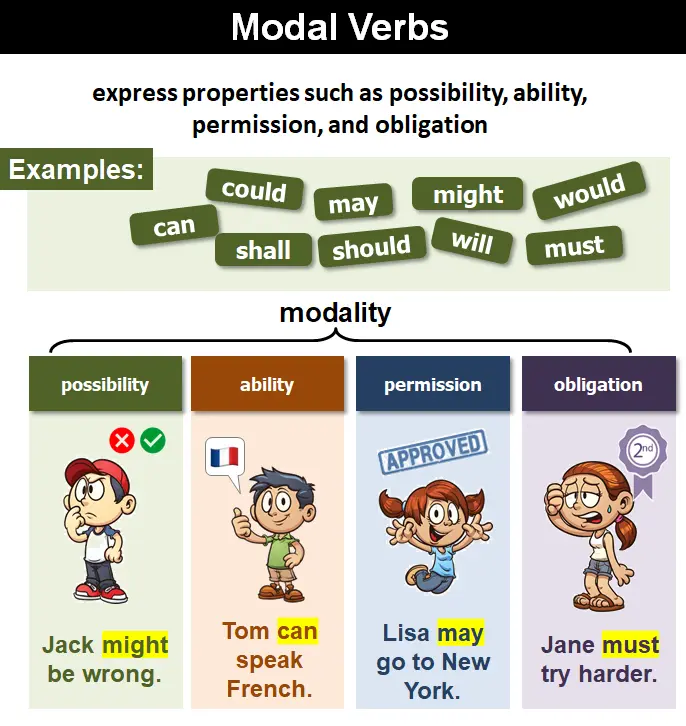
Present Modal Verbs
Subject + Modal Verb + Base Form of Main Verb + (complements/phrases)
Unlike a normal verb, a modal verb does not change. In other words, a modal verb does not conjugate, have participle forms, or have an infinitive form. For example:
play/plays playing/played [to play]
can X X
Modal Verbs Showing Possibility
“can,” “could,” “may,” or “might” + [base form]
Alan can play football against St. Joseph’s.
Alan could play against St. Joseph’s because he cancell[ed] his holiday.
(Note that “could” is the past-tense version of “can.”)
We use could because of the word cancelled. Its past tense so the possibility takes in past tense..hence ‘could’.
People may hear your words, but they feel your attitude.
(This means “people will likely hear your words.”)
You might be wrong.
(This means “maybe you are wrong.”)
Modal Verbs Showing Ability
“can” or “could” + [base form]
John can speak German.
(“Can” is most commonly used to show ability. This means “John is able to speak German.”)
John [could] speak French when he [was] a boy.
(Note that “could” is the past-tense version of “can.” This means “John was able to speak French.”) We’re talking past tense there because of [was], hence the possibility ‘can’ must be in past tense, hence ‘could’.
Modal Verbs Showing Permission
“can” or “may” + [base form]
You can swim in the lake.
(“Can” is also used to express permission.)
You may swim in the lake.
(“May” is more polite than “can” when expressing permission.)
Modal Verbs Showing Obligation
“shall,” “should,” or “must” + [base form]
We shall defend our island, whatever the cost may be.
(Shall means “expressing a strong assertion”, so “We have no option but to defend our island.”)
The aim of argument should be progress not victory.
(This means “It is right if the aim of argument is progress.”)
You must do the things you think you cannot do.
(This means “It is right to do the things you think you cannot do.”)
Modal Verbs Showing Condition
“would” + [base form]
The word “happy” would lose its meaning if it were not balanced by sadness. correct tick (Swiss psychiatrist Carl Jung)
(Sadness is needed for “happy” to exist. It is a condition.)
Past modal verbs
Subject + modal verb + have + past participle + (complements/phrases)
The format below is another common way of using modal verbs:
[modal verb] + “have” + [past participle]
This structure is typically used for expressing modality (e.g., possibility, ability, permission, obligation, and condition) in the past tense.
Framework and Vocabulary homework
Given a list of vocabulary words
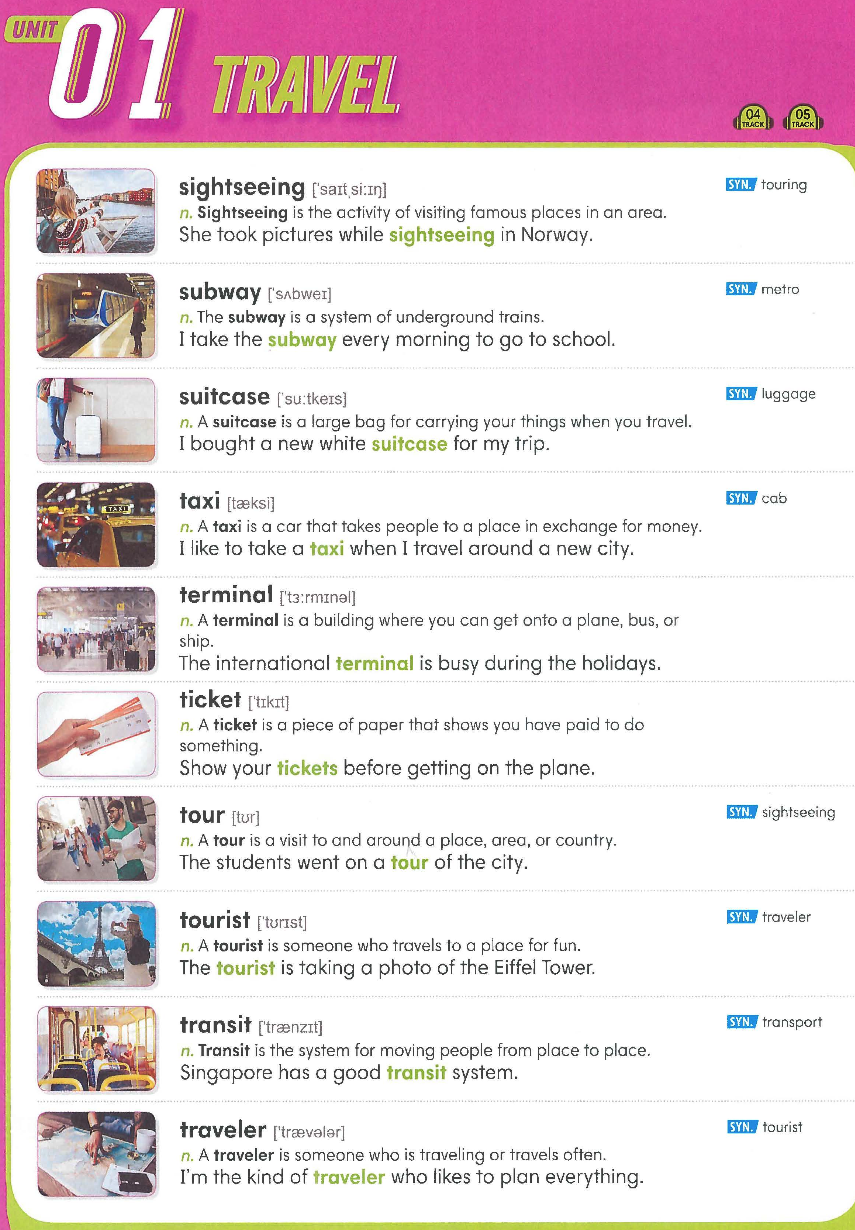
Use the frameworks from this link:
and insert the vocabulary words into these frameworks.
For Example
agree (verb):
Say you want to use framework 2
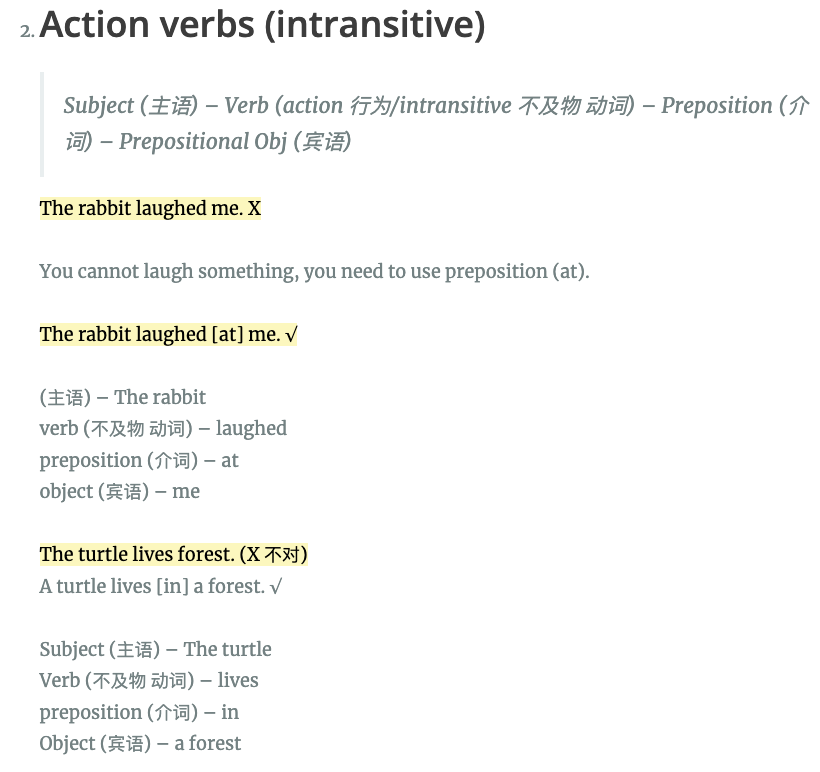
You’d write:
I (s) agree (v) with (p) you(obj). (2)
Say you want to use framework 5
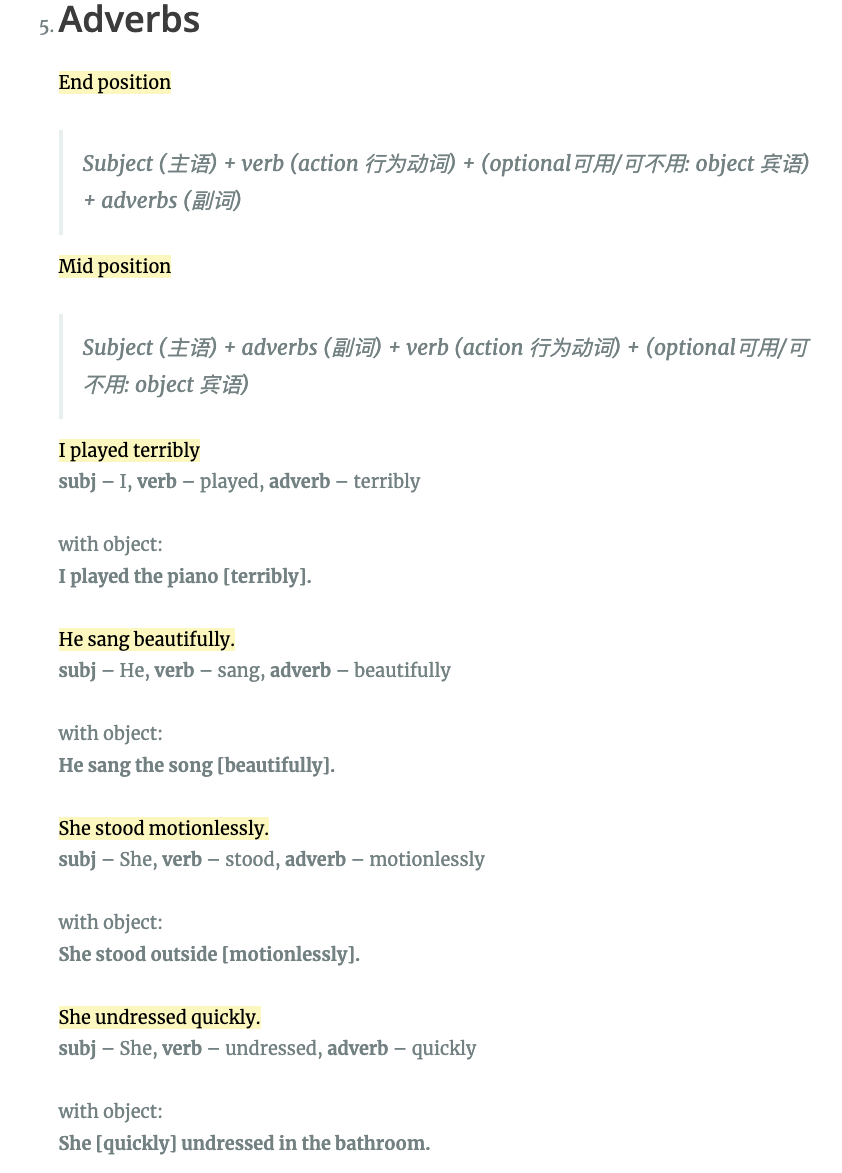
You’d write:
I (s) agree(v) wholeheartedly (adv). (5)
Say you want to use framework 6
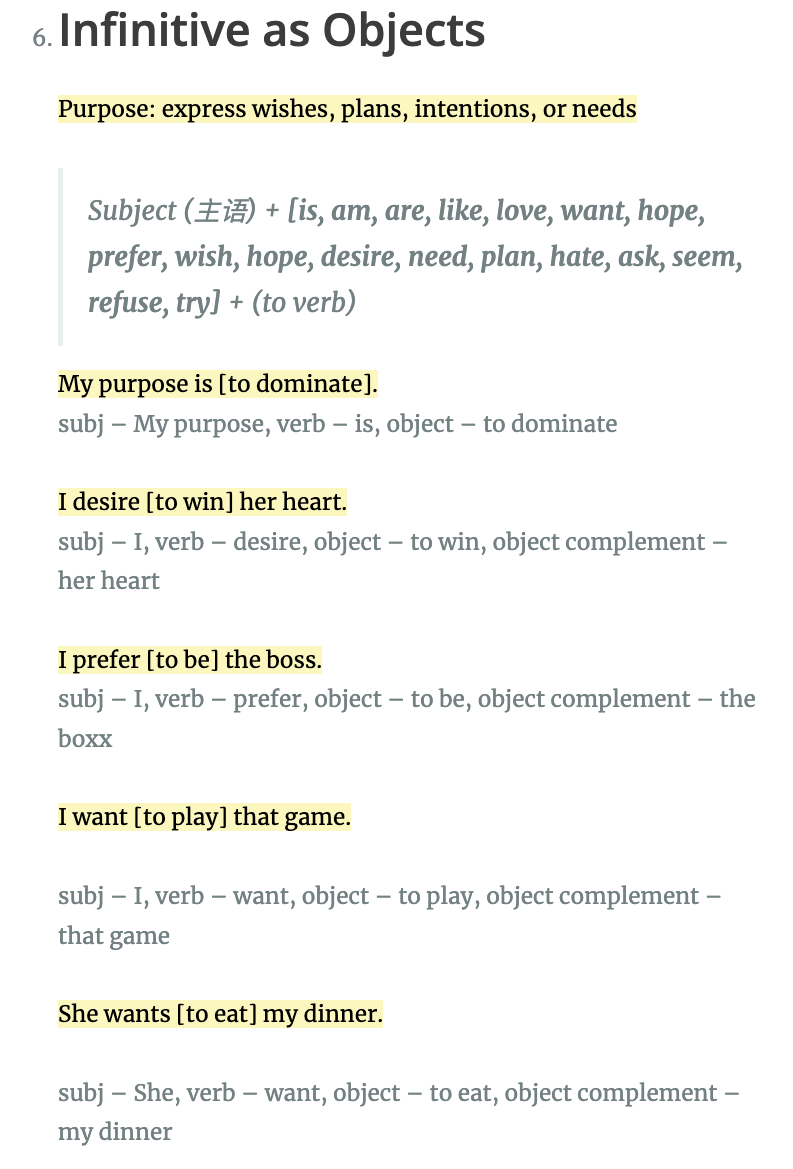
You’d write:
I (s) want (v) [to agree] (obj). (6)
for vs because, but vs yet
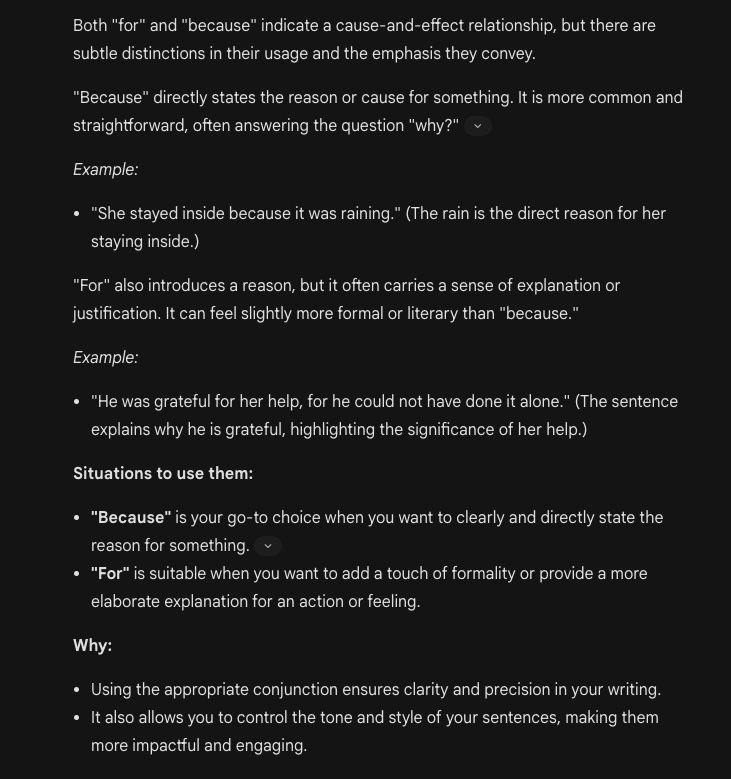
But vs Yet
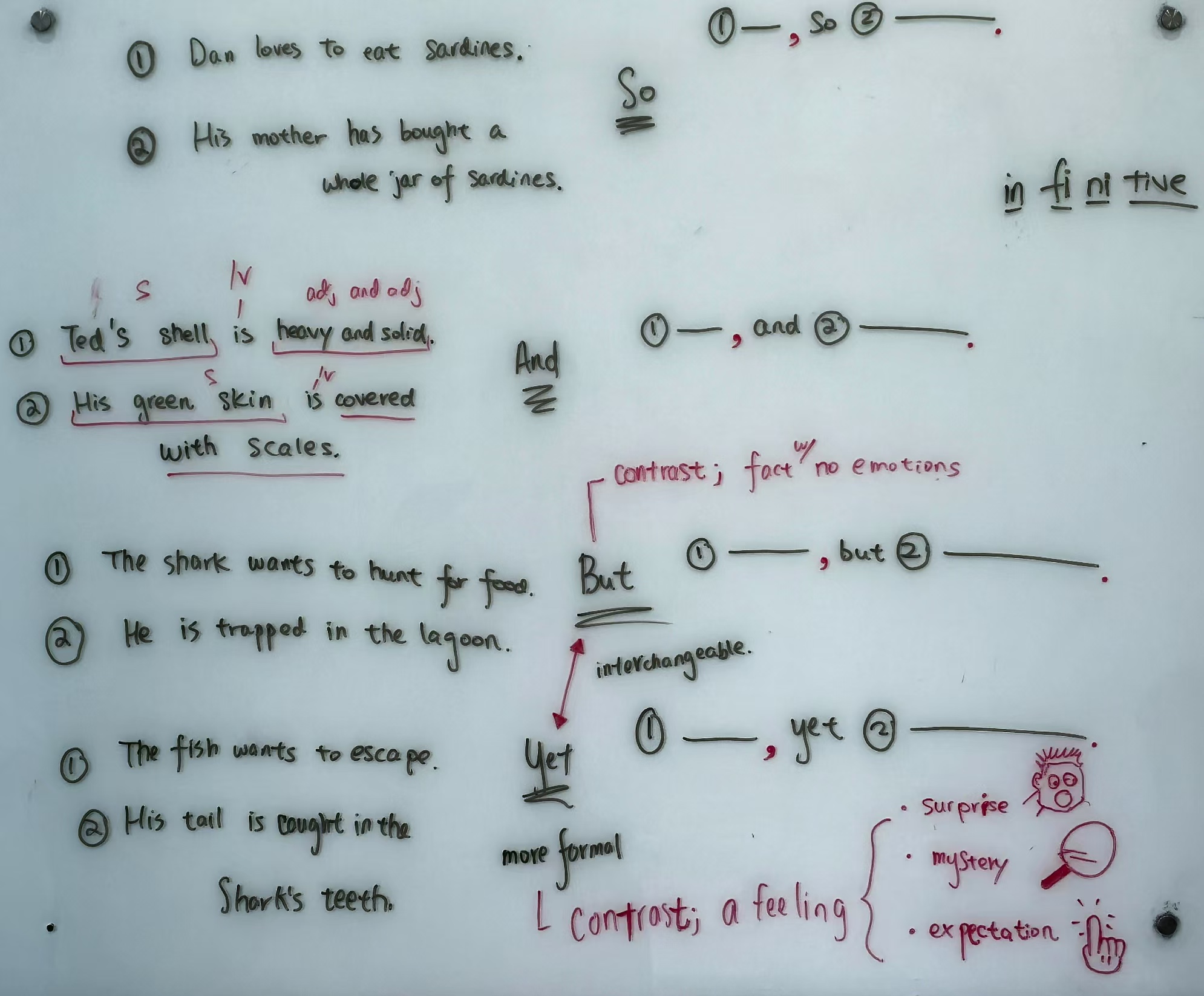
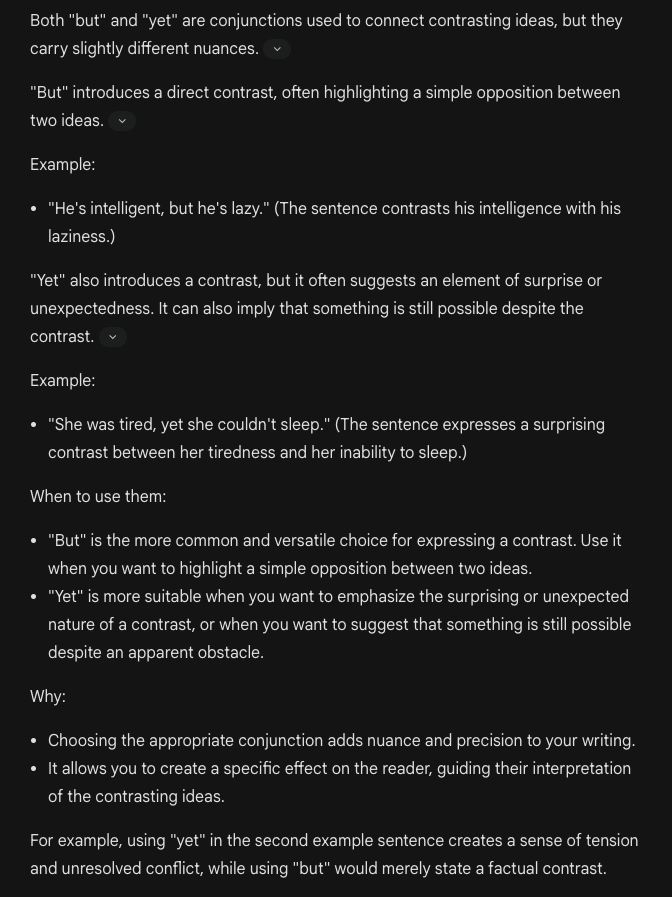
Rules for 财产 (money for property) in China
In China, they can demolish a perfectly legal property with 90 days notice.
On the 91st day they will demolish the property if it was constructed post 1977 and the land registration rules will be brought in.
As the owner (or original settler) of the land/property, you will be compensated a minimum of 1.36 times and maximum of 3.5 times what the property cost you.
OR
You will be given between 0.76 times to 1.8 times the land equivalent as compensation within a radius of 20 Kms of where you live
It’s 90% Money now and very few cases are compensated with equivalent land
The Compensation is IMMEDIATE and before the demolition notice
This means you get the money before you have to vacate your property
The entire money, tax free minus 25% which will be paid to the bank towards any mortgage you may have borrowed or whatever you owe the bank, whichever is lesser
So if my 2 Million RMB condo built in 2019 is demolished, I will get
2 Million * (0.93)* 1.78 = 3.31 Million RMB
If I owe the bank 1 Million RMB, then 827,700 RMB will be paid towards that loan
Law for Illegal Encroachment
Illegal properties are impossible in China post 2017 because every property is placed within a satellite grid with its own boundary as of 30/06/2017
From that day onwards, any encroachment can be settled in ten minutes with a simple satellite image as on 30/06/2017 and a resolution run which can show any encroachment
For Pre 2017 properties, any illegal encroachment will never be blamed on the purchasers of the property
Unlike India
Why?
Again Simple
The State verifies the property for you if it’s residential
You pay the fee, submit your escrow details where you prove you deposited the 15% down payment on the property and the State will examine all the history (Now digitized) and issue a clearance of the property and it’s legality
No more paper for properties purchased since 2010 except older deeds
So since the State clears legalities, the State will be responsible for mistakes and the State will compensate
The State HAS TO COMPENSATE within 60 days Or place the equivalent of what you paid for the property in Escrow in your name and take another 120 days to confirm legality or pay the money to you
Plus while I ain’t sure, I can pretty much say I strongly feel the officials will be taken to task for such a mistake
One thing in China – the Common man never suffers much
The laws and system are made for the common man rather than Plutocrats or a bunch of Rich Lawyers sitting in the Capital or a bunch of Illiterate politicians
STEAL indirect characterization
The STEAL writing method is a technique used to develop characters indirectly, showing their personalities through their:
-
Speech: What they say and how they say it
Thoughts: What they think and believe
Effect on others: How other characters react to them
Actions: What they do
Looks: Their appearance and body language
Simple Example
Direct Characterization: “John was nervous”
Indirect Characterization:
John fidgeted with his tie (Actions), his voice cracking as he stammered,
“I-I’m ready for the presentation.” (Speech)
The audience exchanged worried glances (Effect on others).
John managed a sly grin and thought to himself, “You got this ole boy. Can’t fail me now!” (Thoughts)
He slowly took his grimy hands out of his pockets and took the microphone. (Looks)
Gerund Phrase
ref – https://www.grammar-monster.com/glossary/gerund_phrase.htm
A gerund phrase is a phrase that consists of a gerund, its object, and any modifiers.
Removing the bug quickly is the way.
Here are the parts of the gerund phrase:
gerund: “removing”
direct object: “the bug”
modifier: “quickly”
I like singing songs in the shower.
Here are the parts of the gerund phrase:
gerund: “singing”
direct object: “songs”
modifier: “in the shower” // prepositions are simply called ‘modifiers’
Try to serve the soup without dropping the tray this time.
Here are the parts of the gerund phrase:
gerund: “dropping”
direct object: “the tray”
modifier: “this time”
Gerund with no direct objects
Here is an example without an object:
Moving quickly is the key to survival.
Here are the parts of the gerund phrase:
gerund: “moving”
modifier: “quickly”
Without modifier
I want to talk to you about buying those magic beans.
Here are the parts of the gerund phrase:
gerund: “buying”
direct object: “those magic beans”
[Eating blackberries quickly] will make you ill.
In the gerund phrase above:
“Eating” is the gerund.
(A gerund phrase always starts with the gerund.)
The word “blackberries” is the direct object of the gerund.
(The object of a gerund is also called the gerund complement.)
“Quickly” is a modifier (an adverb).
Same as above, but with an adverbial phrase
[Eating blackberries (without washing them)] will make you ill.
Gerund – “Eating”
direct object – blackberries
modifier is the phrase “without washing them.”
Just like “quickly” in the first example, it is an adverb.
In fact, “without washing them” is an adverbial phrase, where “without” is a preposition:
gerund phrase (“washing them”)
gerund (“washing”)
its direct object (“them”).
[Eating blackberries [without washing them]].
Gerund Phrase and Adverbial Phrase
Like all nouns, a gerund phrase can function as a subject, an object, or a complement within a sentence.
She hates waiting(ger) [for trains] modifiers.
(The gerund phrase is the direct object of the verb “hates.”)
She knew a lot about growing(gerund) tomatoes (gerund’s dir obj).
(The gerund phrase is the object of the preposition “about.”)
Her biggest mistake was caring(n) [too much] modifiers.
(The gerund phrase is a subject complement that completes the linking verb “was.”)
Purpose
Verb + ing Continuous form is used to show an action that is continuous or in general.
describe an ongoing action
描述 正在 进行 的行动
run + ing = running
Situation 1 (正在做的动作) – I am (helping verb) running(main verb). (This is used as a present participle to denote a continuous action now)
Situation 2 (形容词) – The running water is cold (present participle used as an adjective)
Situation 3 (现在进行时 作为名词 –> 动名词) – Sandy loves running. (running is used as a noun (gerund) at the object position. Its to describe the general continuous action that Sany likes to do)
Provide clarity and shorten the sentence
Ted serves the soup, and he does not drop the tray while he serves. (14)
Ted serves the soup without dropping the tray (8).
If you eat blackberries that have not been washed, they will make you sick. (14)
Eating blackberries without washing then will make you sick. (9)
Additional Information
Gerund phrases, which are groups of words built around a gerund (a verb ending in “-ing” that functions as a noun), are incredibly versatile and can be used in various grammatical roles within a sentence. Here’s a comprehensive list of their common uses:
1. Subject of a Sentence:
* [Swimming] is my favorite exercise.
* [(Taking) a break] is important for productivity.
* [(Learning) a new language] can be challenging but rewarding.
2. Direct Object
* He enjoys [(playing) the guitar].
* She loves [(reading) mystery novels].
* They avoided [(making) eye contact].
3. Indirect Object
* He gave [singing in the choir] a try.
* She dedicated her time to [(helping) others].
* They offered [(donating) their time) to the cause.
4. Subject Complement
* Her passion is [dancing].
* His hobby is [(collecting) stamps].
* The hardest part was [(saying) goodbye].
5. Object of a Preposition:
* She is good [{at} (solving) puzzles].
* He is interested [{in} (learning) to code].
* They are tired [{of} (waiting) in line].
6. Appositive:
* His favorite activity, [(hiking) in the mountains], always brings him joy.
* Her dream, [(becoming) a pilot], motivated her to study hard.
* My biggest fear, [(speaking) in public], held me back for years.
Comma and punctuation conventions
ref – https://www.stylemanual.gov.au/grammar-punctuation-and-conventions/punctuation/commas
Comma Usage 3/3
Put a comma after the close of any letter (personal or business).
Put a comma after the greeting of a friendly letter.
Examples:
Dear Aunt JoAnne,
Sincerely,
Use commas to set off a noun of direct address.
Examples:
Peter, please come over here.
Please come over here, Peter.
Please, Peter, come over here.
Use a comma in front of a direct quotation that is not at the beginning of a sentence.
Use a comma to separate information about the speaker in a direct quotation.
Examples:
Mrs. Scotto said softly, “The math test tomorrow consists of one thousand problems. Class dismissed.”
“The math test tomorrow,” Mrs. Scotto said softly, “has a thousand problems on it.”
Note: Commas (and periods) always go inside quotation marks.
Use commas to separate parts of addresses and places when they are written in a sentence.
Example:
She lived at 20 Joyce Road, Peabody, Massachusetts, until she moved to 51 Grove Street, Lynn, Massachusetts.
Put a comma after the day of the week, after the number of the day, and after the year when a date is within a sentence.
No comma is needed if only the month and year are in the sentence. (Never put a comma between the month and the number of the day.)
Examples:
They were married on Saturday, July 31, 1999, under stormy skies.
He was born in July 1976.
Use a comma before and after words and abbreviations when they are used to introduce an example or series.
Use a comma to set off etc.
Note: i.e. and e.g. are the abbreviations of Latin phrases.
i.e. means “that is to say” (Latin: id est)
e.g. means “for example” (Latin: exempli gratia)
Example:
There are a lot of science subjects one can take at the college, e.g., molecular biology, cosmology, advanced chemistry, quantum physics, etc.
Note: Do not use the phrase “and etc.” Et cetera already means “and so on,” so this is redundant.
Comma Usage (2/3)
ref – http://www.brainfuse.com/curriculumupload//1185321789404.html
Put a comma after an adverbial phrase at the beginning of a sentence.
An adverbial phrase is a group of words (without a subject or a verb) that does the work of an adverb. It modifies the verb and answers questions like how? where? when?)
Standard Form: Adverbial phrase, rest of sentence.
Example: In the distant future, we may all be driving electric cars.
Exception 1: If the opening adverbial phrase is very short the comma is optional.
Example: Before dawn we should prepare for our trip.
Exception 2: If the word after the adverbial phrase is a verb, do not use a comma after the phrase.
Example: In the depths of the wilderness lives a ferocious lion.
Use commas to set off nonrestrictive phrases and clauses
These phrases and clauses give information but are not really essential to the meaning of the sentence.
Sample Form: Subject, nonrestrictive clause, predicate.
Example: Katelyn, who is an only child, demands a lot of attention.
Do not use commas around restrictive clauses.
Restrictive clauses provide information essential to the meaning of the sentence.
Sample Form: Subject restrictive clause predicate.
Example: The boy [who broke the window] is at the door.
Use commas to set off nonrestrictive appositives.
An appositive is a noun that comes after another noun and gives additional information about it. An appositive can come in the middle or end of a sentence.
Examples:
Dr. Sogohan, the headmaster of our school, never shouts.
One person who never shouts is Dr. Sogohan, the headmaster of our school.
Do not use commas around restrictive appositives.
Restrictive appositives provide information crucial to the understanding of the sentence and should not be set apart with commas.
Example: The musician Bobby Groffman visited our town.
Put a comma after words like oh, yes, and no at the beginning of a sentence.
Form: Interjection, independent clause.
Example: Yes, I do have what you’re looking for.